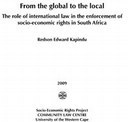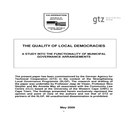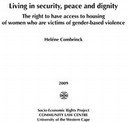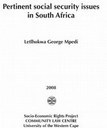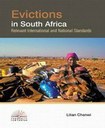Socio-Economic Rights Project Research Series 6, 2009. This research paper by Redson Edward Kapindu explores the vital role of international human rights law and jurisprudence, including the UN and African human rights systems and policy frameworks, in advancing socio-economic rights at the domestic level in South Africa. The paper starts by providing a general overview of the international (including African regional) human rights system and their relevance. The paper proceeds to explore the question of the applicability of international human rights law under the South African Constitution. In this regard, the paper provides an incisive discussion of the domestic application of international socio-economic rights obligations in South Africa, paying special regard to the significance of General Comment 9 of the CESCR and the issue of minimum core obligations. The paper concludes with an exposition of some of the challenges in the application of international law in advancing socio-economic rights in South Africa and provides some recommendations.
Good governance in municipalities is essential for service delivery. Without clear reporting lines, functional accountability mechanisms and a clear separation of politics from administration, municipalities do not stand a chance at delivering on their mandate to communities. This research paper examines the practice of governance in municipalities. More than 30 interviews were conducted to establish how councillors relate to officials, how political parties relate to municipalities and how municipal office-bearers relate to one another. The picture it paints is bleak.
The brochure contains information on the following: What does the New Children's Act do? How does the Children's Act protect our children? How are children protected against HIV, STD'S and unplanned pregnancies? Who must report abuse? What are our parental responsibilities and rights? Who has parental responsibilities and rights? What about child-headed households? What about our cultural and religious practices?
Socio-Economic Rights Project Research Series 5, 2009. This research paper by Heléne Combrinck examines the nature and extent of state duties to promote the realisation of the right to have access to adequate housing of women who are victims of gender-based violence, with specific reference to domestic violence. The paper first sketches the background to domestic violence and housing in South Africa generally and explains the housing needs of women experiencing domestic violence as well as the link between domestic violence and forced evictions. It then examines constitutional obligations to promote access to housing, with reference to the Grootboom and subsequent judgments. The paper further sets out the legislative and policy framework supporting access to housing in South Africa and examines whether this framework currently makes adequate provision for women who are victims of domestic violence. Though the focus is on South Africa, the paper also looks at the standards and norms that have emerged in international human rights law, with specific reference to the rights to adequate housing, gender equality and freedom from violence. Finally, the paper proposes certain recommendations based on the conclusions reached.
This issue focuses on the non-implementation of judicial enforcement of socio-economic rights; increasing the minimum essential amount of water; improving the administration of social assistance services and other issues related to socio-economic rights.
Municipalities are key institutions in bringing about sustainable human settlements that respond adequately to the challenges and implications of the HIV and AIDS epidemic.
The Constitution provides that “everyone has a right to administrative action that is lawful, reasonable and procedurally fair”. This entitlement extends to municipal employees and must therefore be reflected in municipal labour and administrative practices.
The Municipal Demarcation Board (MDB) recently confirmed that Msunduzi, Mangaung and Buffalo City municipalities are to become category A (metropolitan) municipalities, bringing the total number of metropolitan municipalities to nine.
The Children’s Amendment Act (Act 41 of 2007) was signed into law on 18 March this year. The Act, together with draft regulations recently published for public comment, represents the final step in the arduous, ten-year journey of reviewing the Child Care Act.
Over the past weeks, the impact of the leadership change in the African National Congress on government has become patently visible. The most important change was obviously manifested in the resignation of the President, three provincial premiers and a number of national Cabinet members, including the Minister for Provincial and Local Government.
The powers and functions shared between provincial and local government have traditionally been a source of great confusion and concern for municipalities. Ill-defined powers and functions have often led to duplication, inefficiencies and arguably even deterioration in the delivery of services to communities.
Generally, a municipality may only levy taxes (other than property rates) in terms of empowering legislation. The Municipal Fiscal Powers and Functions Act (Act 12 of 2007) outlines a procedure whereby a municipality may apply to the National Treasury for approval to impose new taxes.
Energy experts agree that the installation of domestic solar water heaters (SWHs) could significantly reduce the demand for electricity. The figures suggest that a roll-out of SWHs could eliminate the need for one large coal power station (and thus significantly reduce CO2 emissions).
On 11 June 2008, the Cape High Court handed down a judgment that set an important precedent about councillors’ individual liability for taking or supporting illegal decisions.
Ward committees were introduced after the December 2000 municipal elections to supplement the role of elected councillors. As such, they were intended to create a bridge between communities and the political and administrative structures of municipalities. Many observers argue, however, that ward committees are not functioning as intended and that instead of enhancing the environment of participatory governance, these structures have actually undermined it by displacing many other channels for public participation.
Socio-Economic Rights Project Research Series 4, 2008 This research paper, by Letlhokwa George Mpedi, provides some perspectives on the South African social security system, including the South African Social Security Agency. The paper first analyses the social and political context of poverty in South Africa. It then proceeds with a theoretical discussion of the concepts of social security and comprehensive social protection. This is followed by an exploration of the South African social security framework - the legal, institutional and administrative framework, the scope of social security coverage, and social security adjudication and enforcement. Finally, the paper identifies gaps and challenges within the social security system, assesses the opportunities for developing a comprehensive social security system in South Africa, and provides some recommendations as to how the social security system might be improved. Download the Socio-Economic Rights Project Research Series 4, 2008
Forced evictions threaten a range of human rights. These include the rights to human dignity, security of the person, privacy, health, access to adequate housing, education and life, as well as freedom of movement and freedom to choose one’s residence.
Socio-Economic Rights Project Research Series 3, 2008 This research paper by Christopher Mbazira reviews a number of socio-economic rights judgments and discusses the extent to which the orders granted in those cases have been complied with. It also sketches the courts’ approach to interpreting the substance of socio-economic rights. The paper goes on to suggest the best strategies for implementing court orders in socio-economic rights cases. In other words, saying goodbye to the “weakest link” in socio-economic rights litigation. Download the Socio-Economic Rights Project Research Series 3, 2008
